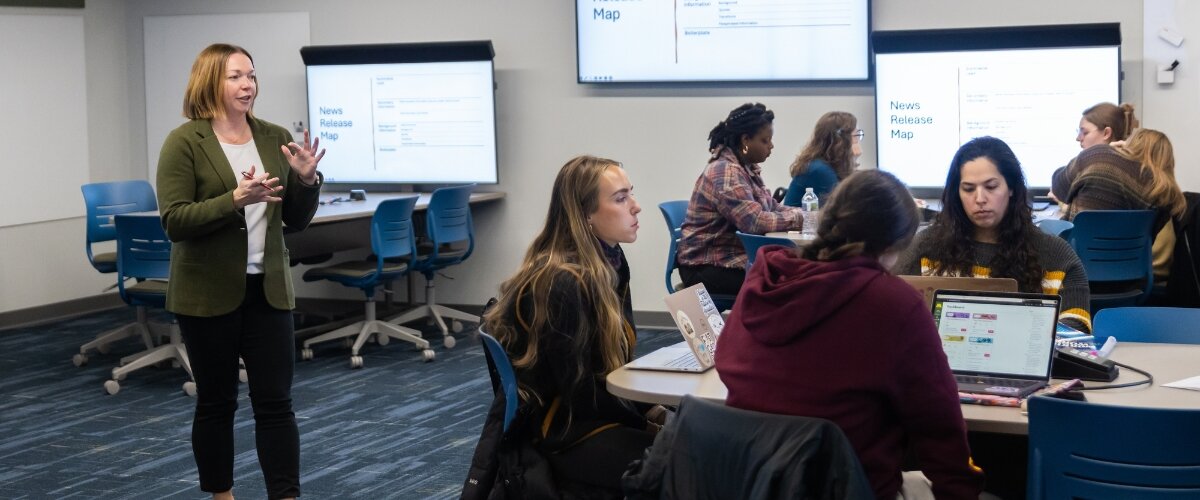
Empowering graduate students to communicate and connect
After building the undergraduate agricultural communication and marketing curriculum from the ground up, Rebecca Swenson is now equipping graduate students with the skills to share their science.

When asked to picture a scientist, Americans think of someone who is intelligent, but not necessarily a good communicator. Rebecca Swenson, associate professor of agricultural, food, and natural resource communication, is working to change that perception, by equipping scientists—within CFANS and at universities across the country—with the science communication skills needed to connect with their intended audiences.
Curriculum from the ground up
Swenson joined CFANS in 2012 as the first agricultural communication faculty member. She provided the vision for a new Agricultural Communication and Marketing (ACM) major, including creating several courses from the ground up to support the program. Consultation with the career services revealed that all graduating students need strong communication skills as they enter the workforce, which led to general courses relevant to students in all CFANS majors. Advanced courses with an emphasis on collaboration, and career exploration courses with input from alumni and professionals round out the curriculum. An undergraduate minor in Agricultural and Environmental Science Communication was recently added to the course catalog as well.
Since joining the faculty, Swenson’s teaching, curriculum design, and programmatic leadership have been recognized by the University with a Distinguished Teachers Morse-Alumni award in 2019, and nationally; earlier this month she received a National Teaching Award for Food and Agricultural Sciences from the USDA.
A revitalized graduate program
Building on the success of the ACM undergraduate curriculum, Swenson is now addressing the growing need for advanced science communication training at the graduate level. “We knew that we needed to do something to revitalize the graduate program, " says Swenson.
Swenson’s colleague Greta Tank, an alum of the ACM program, shares the sentiment: “There was feedback from alumni who shared the need for a graduate level communications program for agricultural professionals.”
The existing graduate program had been placed on hold for many years, as it was limited in scope and not serving the current needs of students. Swenson and her colleagues in AECM were able to restructure the program and add offerings for graduate students interested in communication and public outreach. A new Advanced Studies and Research (Plan B) track, aligns with Swenson’s areas of research; this first semester, four students have enrolled in the revamped degree program. The team is also working on a graduate minor in science communication and public engagement, which they hope will be an option for students within a year.
First steps this fall
As part of the redesign, Swenson is teaching a new graduate-level course this semester: AECM 5252: Principles of Science Communication, Public Outreach, & Social Change for Agricultural, Environmental, and Life Sciences. The course covers theory, research, strategies, and tactics for effective science communication that is tailored to an intended audience.
“The graduate students are so motivated and dedicated,” says Swenson. “They’ve been great to work with.” Students in the course come from a variety of backgrounds; some are working Extension and outreach professionals, and others are pursing science degrees in CFANS and CBS.
Swenson is challenging her students to create products—a TED-style talk, a social media campaign, or a podcast—that both informs and leads to change. “It has been inspiring to watch the graduate students develop powerful messages that share their science expertise and engage particular audiences in discussion about the science-based topics that they are passionate about - from foraging to local food systems to chronic wasting disease, “ says Swenson. “I think investing in science communication for graduate students really strengthens the work we do as a University and supports the overall land-grant mission of public outreach.”
Breaking down barriers
Graduate students are highly trained in their subject area, but are not always equipped with the skills to communicate their science to a broader audience. Swenson has researched the barriers that science graduate students face. The fear of saying the wrong thing, especially on social media, was a concern the grad students expressed. “Students have a desire to have a broader impact and do outreach,” says Swenson, “but they’re not sure where to start.”
Swenson’s aims to address these barriers in her courses, creating a space where students can learn the theory of science communication, and develop their skills in a supportive environment before speaking more publicly to their target audience.
Mission driven curriculum
To expand the reach of their graduate-level science communication curriculum beyond the University of Minnesota, Swenson is leading an initiative to develop sharable, online curriculum modules. These resources, which will cover topics ranging from communication theory to media strategies like data visualization and storytelling, will be accessible to educators nationwide. Several of the modules are now embedded into CFANS courses that are open to all graduate students.
Swenson’s work—both on campus and online—is helping fulfill the University’s mission by equipping the next generation of agricultural and environmental scientists with the skills they need to engage effectively with the public, shape policy, and drive meaningful change in their fields.





